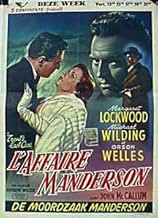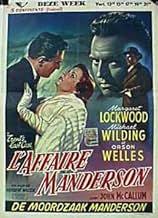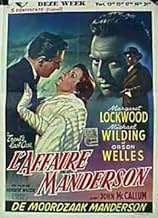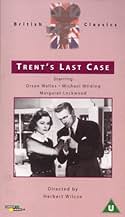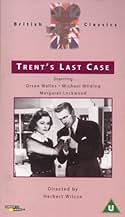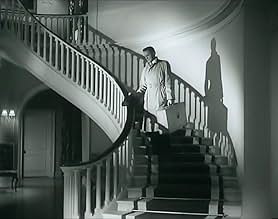IMDb RATING
6.0/10
642
YOUR RATING
A reporter investigates a rich businessman's death. While police rule it suicide, Trent believes it's murder and grows intrigued by the widow and secretary.A reporter investigates a rich businessman's death. While police rule it suicide, Trent believes it's murder and grows intrigued by the widow and secretary.A reporter investigates a rich businessman's death. While police rule it suicide, Trent believes it's murder and grows intrigued by the widow and secretary.
- Director
- Writers
- Stars
Geoffrey Bayldon
- Reporter in Court
- (uncredited)
Ernest Blyth
- Concert Attendee
- (uncredited)
Robert Cawdron
- Police Constable
- (uncredited)
John Chandos
- Tim O'Reilly
- (uncredited)
Anthony Collins
- Conductor
- (uncredited)
Henry Edwards
- Coroner
- (uncredited)
Eileen Joyce
- Pianist
- (uncredited)
Ben Williams
- Jimmy - Reporter
- (uncredited)
Kenneth Williams
- Horace Evans
- (uncredited)
- Director
- Writers
- All cast & crew
- Production, box office & more at IMDbPro
Featured reviews
Michael Wilding takes up "Trent's Last Case" in this 1952 film directed by Herbert Wilcox for Republic Studios. It's British with a British cast that includes Margaret Lockwood, John McCallum, Hugh McDermott, and one American, Orson Welles, who was probably trying to raise money for a project.
Trent is an artist and also an amateur detective. He gets involved in the suicide of a wealthy man named Manderson, but as he investigates, it looks more and more like murder. One suspect stands out, but how to prove it?
Unlike many detectives in books and movies, Trent is fallible. This is a neat mystery with a few red herrings. I don't agree that it was dull; I think the story itself keeps the film going, as well as the attractive Michael Wilding. Wilding falls in with many of those tall, good-looking British actors from the '50s - Robert Flemying, Michael Rennie, etc., and probably wouldn't be well known here if he hadn't married Elizabeth Taylor. Nevertheless, he was quite urbane with a great voice and acquits himself well as Trent. Margaret Lockwood is lovely as the victim's widow, and she keeps you guessing.
Not as bad as some reviewers claim. Maybe not as good either, but I enjoyed it. Orson Welles apparently had an obsession with using fake noses on his characters. It's really obvious in profile.
Trent is an artist and also an amateur detective. He gets involved in the suicide of a wealthy man named Manderson, but as he investigates, it looks more and more like murder. One suspect stands out, but how to prove it?
Unlike many detectives in books and movies, Trent is fallible. This is a neat mystery with a few red herrings. I don't agree that it was dull; I think the story itself keeps the film going, as well as the attractive Michael Wilding. Wilding falls in with many of those tall, good-looking British actors from the '50s - Robert Flemying, Michael Rennie, etc., and probably wouldn't be well known here if he hadn't married Elizabeth Taylor. Nevertheless, he was quite urbane with a great voice and acquits himself well as Trent. Margaret Lockwood is lovely as the victim's widow, and she keeps you guessing.
Not as bad as some reviewers claim. Maybe not as good either, but I enjoyed it. Orson Welles apparently had an obsession with using fake noses on his characters. It's really obvious in profile.
Agatha Christie considered this intrigue one of the best ever written, and it certainly is. The mystery is deep here, and as it gradually is unravelled you are in for any number of surprises. The actors are outstanding, with Michael Wilding as the detective intruding on the private lives of the young widow Margaret Lockwood and the man who loves her, who is the prime suspect, while Orson Welles as the victim provides an impressing finale as he enters in the final flashback. Miles Malleson plays an important part as a reluctant participant in the plot, while the story is what really matters. Herbert Wilcox' direction is faultless but very formal, giving the film a somewhat conventional character - there is no cinematography to speak of, while music plays an important part - Eileen Joyce has a moment as a performing pianist, and the film score is by Anthony Collins, who is also seen acting as a conductor - one of his rare appearances on film. After having reached the end of the story, and Michael Wilding closing his last case as Trent, yuo just have to agree with Agatha Christie about the marvellous windings of this plot.
MICHAEL WILDING is an armchair detective who sets out to determine whether or not the death of ORSON WELLES was suicide or murder. He thinks he's solved the case, only to learn that all is not what it appears (without giving the outcome away).
Unfortunately, the script is a dreary, talky and ponderous, making the film appear to be an amateurish stage play, although based on a novel. It's static. Nothing at all cinematic about the approach, nor is there any imagination in the directing.
Of all the players, MARGARET LOCKWOOD as the beautiful wife of the deceased man and JOHN McCALLUM as the man's secretary have key roles that they play with assurance. ORSON WELLES, with fake nose and bushy brows, might as well have been from another film. His ten or fifteen minutes of time on screen renders nothing but ham. Director Herbert Wilcox was evidently unable to tone him down and as a result his key scenes throw the film off stride. MICHAEL WILDING has a colorless role as the newspaper reporter who suspects foul play but can't prove anything.
With a talky script and lack of any cinematic touches, TRENT'S LAST CASE goes nowhere fast and leaves the viewer expecting a strong twist that never arrives--instead, a flat ending.
Production values are fine even though the film comes from the usually low-budget Republic studios.
Unfortunately, the script is a dreary, talky and ponderous, making the film appear to be an amateurish stage play, although based on a novel. It's static. Nothing at all cinematic about the approach, nor is there any imagination in the directing.
Of all the players, MARGARET LOCKWOOD as the beautiful wife of the deceased man and JOHN McCALLUM as the man's secretary have key roles that they play with assurance. ORSON WELLES, with fake nose and bushy brows, might as well have been from another film. His ten or fifteen minutes of time on screen renders nothing but ham. Director Herbert Wilcox was evidently unable to tone him down and as a result his key scenes throw the film off stride. MICHAEL WILDING has a colorless role as the newspaper reporter who suspects foul play but can't prove anything.
With a talky script and lack of any cinematic touches, TRENT'S LAST CASE goes nowhere fast and leaves the viewer expecting a strong twist that never arrives--instead, a flat ending.
Production values are fine even though the film comes from the usually low-budget Republic studios.
Surprisingly for me, this is a remake of a movie based on a novel written in 1913 or whereabouts. Surprisingly, because the plot is nothing special, a sort of opposite-gender "Leave her to Heaven", but a lot more lackluster.
Michael Wilding is the titular Trent, a bland and moderately charming artist-journalist (?) investigating the bizarre suicide of unpleasant billionaire Sigsbee (???) Manderson. What with the weird name? Anyway, after a coroner's verdict of suicide, Trent is intrigued by allegations of Manderson's wife having an affair with her husband's dashing secretary.
Lockwood plays the wife and she's the only substantial and charming presence in the movie. There is a lot of talk and only by the third act we get to see Orson Welles with bushy eyebrows and prosthetic nose as Sigsbee and he's indeed a malevolent character but also very grotesque, due to the ridiculous disguise.
After long explanations from all the players the movie ends on a happy, albeit forced, note.
Due to Welles appearing so late and to take advantage of the popularity of an earlier film, in Italy this was titled "The Third Man Returns", even if it has nothing to do with that masterpiece.
Michael Wilding is the titular Trent, a bland and moderately charming artist-journalist (?) investigating the bizarre suicide of unpleasant billionaire Sigsbee (???) Manderson. What with the weird name? Anyway, after a coroner's verdict of suicide, Trent is intrigued by allegations of Manderson's wife having an affair with her husband's dashing secretary.
Lockwood plays the wife and she's the only substantial and charming presence in the movie. There is a lot of talk and only by the third act we get to see Orson Welles with bushy eyebrows and prosthetic nose as Sigsbee and he's indeed a malevolent character but also very grotesque, due to the ridiculous disguise.
After long explanations from all the players the movie ends on a happy, albeit forced, note.
Due to Welles appearing so late and to take advantage of the popularity of an earlier film, in Italy this was titled "The Third Man Returns", even if it has nothing to do with that masterpiece.
It's good news for Welles completists that this, the better of the two films he made for Herbert Wilcox in 1952 (to help finance his on-off-on but finally magnificent film of 'Othello') is now available on DVD, though dismally free of extras. As a thriller it is a puzzle almost devoid of suspense, though there are some clever twists at the end. There are polished performances by Margaret Lockwood, John McCallum, Michael Wilding as the classy sleuth Trent, Miles Malleson in one of his best roles and Welles. Welles appears for no more than 20 minutes, in flashback, but, with his formidable false nose, is an intimidating presence as the late Sigsbee Manderson. In a fraught dialogue with McCallum he talks about 'Othello' and the production he's recently seen: "Didn't like the leading actor!" The leading actor was Welles himself, performing at the St James' theatre - a performance I was privileged have seen a year or two earlier, when Ken Tynan, long before PC was thought of, headed his review 'Citizen Coon'!
Did you know
- TriviaIn the film, Sigsbee Manderson (played by Orson Welles) mentions a performance of Shakespeare's "Othello" at the St. James Theatre in London in 1951, in which he disliked the leading actor's performance. This is an in-joke: Welles himself played Othello at the St. James in 1951, under his own direction. Peter Finch played Iago opposite him.
- GoofsDuring the coroners inquest, Trent was seen drawing a sketch of Marlowe. This is not allowed in English Courts. Although court artists are allowed in as members of the public, all drawings must be done by memory outside the courtroom.
- Quotes
Margaret Manderson: He talks of reopening the case.
John Marlowe: You should've ordered him out of the house.
Margaret Manderson: And confirm his suspicions?
- SoundtracksPiano Concerto in C Minor
Music by Wolfgang Amadeus Mozart (as Mozart)
Arranged and Conducted by Anthony Collins (uncredited)
Performed by Eileen Joyce
Details
- Release date
- Country of origin
- Language
- Also known as
- Trent's Last Case
- Production company
- See more company credits at IMDbPro
- Runtime
- 1h 30m(90 min)
- Color
- Aspect ratio
- 1.37 : 1
Contribute to this page
Suggest an edit or add missing content

